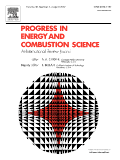
PROGRESS IN ENERGY AND COMBUSTION SCIENCE
Scope & Guideline
Fueling the future with cutting-edge research.
Introduction
Aims and Scopes
- Energy Generation and Conversion Technologies:
The journal emphasizes the study of various energy generation methods, including renewable energy sources such as solar, wind, and biomass, alongside traditional fossil fuel systems. It explores the thermodynamic principles and efficiencies involved in energy conversion processes. - Combustion Chemistry and Kinetics:
A central theme of the journal is the detailed investigation of combustion chemistry, including reaction mechanisms, kinetics, and the formation of pollutants. This includes studies on various fuels, combustion models, and the impact of combustion on the environment. - Advanced Materials and Catalysts:
Research on novel materials and catalysts that enhance energy conversion efficiency and reduce emissions is a key focus. This includes the development of metal-organic frameworks (MOFs), nanomaterials, and catalysts for CO2 utilization and hydrogen production. - Thermal Management and Energy Storage:
The journal covers advancements in thermal energy storage technologies and systems for energy management, including phase change materials and thermochemical storage solutions. - Modeling and Simulation Techniques:
A significant aspect of the journal's scope is the application of computational methods, such as CFD and machine learning, to model and optimize combustion processes and energy systems.
Trending and Emerging
- Carbon Capture and Utilization Technologies:
There is a growing emphasis on carbon capture and utilization (CCU) technologies, which aim to mitigate greenhouse gas emissions through innovative methods such as direct air capture and chemical conversion of CO2 into valuable products. - Sustainable Energy Systems:
Research on sustainable energy systems, including biofuels, electrofuels, and hydrogen production, is increasingly prominent, aligning with global sustainability goals and the transition to low-carbon energy sources. - Advanced Computational Tools and Machine Learning:
The integration of machine learning and advanced computational tools for modeling combustion processes and energy systems is gaining traction, enhancing predictive capabilities and optimization efforts. - Hybrid Energy Systems and Integration:
Emerging studies focus on hybrid energy systems that combine different energy sources and technologies, such as solar-thermal or photovoltaic-thermal systems, reflecting an interest in innovative solutions to meet energy demands. - Nanotechnology in Energy Applications:
The application of nanotechnology in energy systems, particularly in catalysts and materials for energy storage and conversion, is becoming a focal point, showcasing the potential for enhanced performance and efficiency.
Declining or Waning
- Traditional Fossil Fuel Combustion:
Research specifically focused on traditional fossil fuels and their combustion processes appears to be waning, possibly due to the global shift towards renewable energy sources and the growing concern about carbon emissions. - Conventional Energy Storage Solutions:
Studies centered around conventional energy storage methods, such as lead-acid batteries, are less frequently published as the field moves towards more advanced and sustainable options like lithium-ion and flow batteries. - Basic Thermodynamics in Energy Systems:
There is a noticeable decrease in publications focusing solely on fundamental thermodynamics without integration into more complex systems or practical applications, reflecting a trend towards applied research. - Non-renewable Biomass Sources:
Research on non-renewable biomass sources has diminished, likely due to increased emphasis on sustainable and renewable biomass technologies that align better with environmental goals.
Similar Journals

JOURNAL OF ENGINEERING PHYSICS AND THERMOPHYSICS
Fostering Innovation in Condensed Matter and Engineering DisciplinesJOURNAL OF ENGINEERING PHYSICS AND THERMOPHYSICS, published by Springer, is a vital resource for researchers and professionals in the fields of engineering physics and thermophysics. With an ISSN of 1062-0125 and an E-ISSN of 1573-871X, this esteemed journal has been disseminating high-quality research since its inception, covering critical advancements in both condensed matter physics and various engineering disciplines. Despite its classification within the third quartile in both Scopus categories for 2023, the journal remains a significant conduit for innovative studies that push the boundaries of knowledge in thermal and physical engineering, with converged years spanning from 1992 to 1997 and 2004 to 2024. The journal does not offer open access, which means subscribers and institutions have exclusive access to its rich content. As the field continues to evolve, JOURNAL OF ENGINEERING PHYSICS AND THERMOPHYSICS plays an essential role in fostering scholarly discussions and supporting the academic community in tackling contemporary engineering challenges.

Advanced Energy and Sustainability Research
Empowering Research for a Sustainable FutureAdvanced Energy and Sustainability Research is a leading open-access journal published by WILEY since 2020, dedicated to advancing knowledge and understanding in the realms of energy and sustainability. With an impressive impact factor and a commitment to high-quality, peer-reviewed research, this journal serves an international audience of researchers, professionals, and students passionate about addressing critical environmental challenges. The journal encompasses a wide array of topics within environmental science and energy fields, securing notable rankings in Scopus with top percentiles across several categories, including Ecology, Energy Engineering and Power Technology, and Waste Management. Given its open-access model, Advanced Energy and Sustainability Research facilitates the dissemination of cutting-edge research, enhancing accessibility and fostering collaboration within the scientific community. This journal not only plays a pivotal role in shaping public policy and industry practices but also aims to inspire innovative solutions for sustainable development in an increasingly complex world.

Energy Material Advances
Empowering Innovation in Energy ResearchEnergy Material Advances, published by the American Association for the Advancement of Science, stands at the forefront of energy research, showcasing groundbreaking studies in the realm of renewable energy, fuel technology, and materials science. With the journal's commitment to open access since 2020, it aims to democratize knowledge and foster innovation across a global community of researchers, professionals, and students. The journal boasts an impressive impact factor, placing it firmly within the Q1 category across multiple disciplines including Energy (miscellaneous), Fuel Technology, and Renewable Energy, Sustainability and the Environment, highlighting its significance in advancing scholarly discussions. In the latest Scopus rankings, Energy Material Advances ranks among the top 10% of journals in its field, affirming its role as a pivotal resource for current and emerging trends in energy materials. The journal is dedicated to facilitating collaborative efforts and inspiring novel approaches to the challenges posed by energy sustainability and technological advancement.
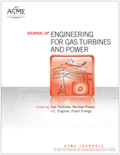
JOURNAL OF ENGINEERING FOR GAS TURBINES AND POWER-TRANSACTIONS OF THE ASME
Exploring Breakthroughs in Energy and AerospaceJournal of Engineering for Gas Turbines and Power - Transactions of the ASME, published by the esteemed American Society of Mechanical Engineers (ASME), is a leading interdisciplinary journal dedicated to advancing the fields of energy engineering, aerospace, nuclear energy, and mechanical engineering. With an impressive history dating back to 1960 and continuing its contributions through 2024, this journal boasts a Q2 ranking in multiple engineering categories, reflecting its strong impact on both academia and industry. Although not an open-access journal, it provides invaluable insights and research findings that cater to the needs of professionals, researchers, and students alike. The journal's ISSN is 0742-4795 with an E-ISSN of 1528-8919, ensuring widespread visibility in the global academic community. Indexed in Scopus, it ranks notably within its fields—21st in Nuclear Energy and Engineering and 51st in Aerospace Engineering—underscoring its relevance and contribution to critical technological advancements. Researchers in this domain will find the journal a vital resource for innovative studies, practical applications, and the latest developments related to gas turbines and power generation.

ISI Bilimi ve Teknigi Dergisi-Journal of Thermal Science and Technology
Unveiling Breakthroughs in Thermal MethodologiesISI Bilimi ve Teknigi Dergisi-Journal of Thermal Science and Technology, published by the Turkish Society of Thermal Sciences and Technology, serves as a pivotal platform for disseminating cutting-edge research in the fields of thermal science, engineering, and materials science. With an ISSN of 1300-3615, this journal not only addresses critical advancements from 2008 to 2013 and 2015 to 2023, but also operates under the auspices of rigorous peer review, contributing to its reputable standing in academia. As a Q4 ranked journal in various disciplines including Atomic and Molecular Physics, Engineering, and Materials Science, it offers researchers and professionals essential insights, though it does not currently operate under an open access model. Situated in Ankara, Turkey, this journal is key to fostering collaboration and innovation among scholars, making it an indispensable resource for students and professionals eager to engage with the latest thermal science methodologies and technologies.
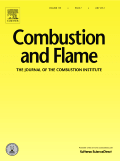
Combustion and Flame
Connecting Scholars in the World of CombustionCombustion and Flame is a premier academic journal published by Elsevier Science Inc, dedicated to advancing the field of combustion science. Since its inception in 1957, this journal has consistently provided a platform for rigorous research and groundbreaking discoveries in the realms of Chemical Engineering, Chemistry, and Energy Engineering, illustrating a significant Q1 ranking across multiple categories, including Fuel Technology and Physics. With an impressive Scopus ranking, comprising the top 10% in fields such as General Physics and Astronomy, and General Chemical Engineering, Combustion and Flame serves as a critical resource for researchers, professionals, and students aiming to explore the complexities of combustion phenomena and their applications. Although it does not offer open access, the journal is known for its comprehensive articles and innovative research papers, fostering scholarly dialogue and the development of emerging technologies. The journal aims to connect researchers globally, ensuring that important findings are shared and disseminated effectively.
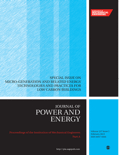
PROCEEDINGS OF THE INSTITUTION OF MECHANICAL ENGINEERS PART A-JOURNAL OF POWER AND ENERGY
Pioneering Discoveries in Power Generation and EfficiencyPROCEEDINGS OF THE INSTITUTION OF MECHANICAL ENGINEERS PART A-JOURNAL OF POWER AND ENERGY, published by SAGE PUBLICATIONS LTD, is a pivotal journal dedicated to advancing the fields of mechanical engineering and energy technology. With a history spanning from 1983 to 2024, this journal provides a respected platform for researchers and practitioners to disseminate findings that address contemporary challenges in power generation, energy efficiency, and sustainable engineering practices. As evidenced by its quarter ranking in Q3 within the categories of Energy Engineering and Power Technology, and Mechanical Engineering, it serves as a significant resource for academics aiming to enhance their understanding and explore innovation in these critical areas. While currently not an open-access journal, the research published here is invaluable for both ongoing education and professional practice, making it an essential read for anyone engaged in the engineering disciplines.
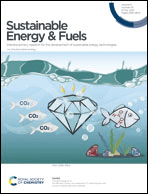
Sustainable Energy & Fuels
Pioneering Research for a Greener TomorrowSustainable Energy & Fuels is a leading journal published by the Royal Society of Chemistry, dedicated to advancing knowledge in the fields of energy engineering, fuel technology, and renewable energy solutions. With its ISSN of 2398-4902 and notable Q1 status in both Energy Engineering and Power Technology as well as Fuel Technology, this journal ranks impressively in the Scopus database, ensuring a strong platform for disseminating impactful research. The journal spans a comprehensive scope aimed at addressing the global challenges of sustainable energy, including innovative methodologies and technologies that promote environmental sustainability. Although it operates under a traditional access model, the journal is committed to providing high-quality content that engages researchers, professionals, and students alike. With significant contributions expected through 2024, Sustainable Energy & Fuels stands at the forefront of facilitating scholarly communication, inspiring advancements in energy technologies that align with sustainability goals.
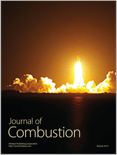
Journal of Combustion
Unlocking the Power of Combustion ResearchJournal of Combustion is a premier academic journal dedicated to the field of combustion science and technology, published by HINDAWI LTD. With an ISSN of 2090-1968 and an E-ISSN of 2090-1976, the journal has been an open-access platform since 2008, ensuring that cutting-edge research is accessible to all. Based in the United States at Adam House, 3rd Flr, 1 Fitzroy Sq, London W1T 5HF, England, the journal publishes articles spanning various relevant disciplines, contributing to knowledge in Chemical Engineering, Fuel Technology, and Energy Engineering. As of 2023, it ranks in the Q3 quartile in Chemical Engineering (miscellaneous) and Fuel Technology, and in Q4 in Condensed Matter Physics and Energy Engineering and Power Technology, highlighting its growing impact and relevance in these fields. Researchers will find valuable insights as the journal converges its findings from 2010 to 2024. With a focus on promoting innovative approaches and exploring new frontiers in combustion research, the Journal of Combustion continues to be an essential resource for academics, professionals, and students committed to advancing the understanding and application of combustion processes.
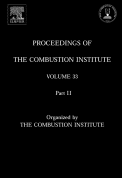
PROCEEDINGS OF THE COMBUSTION INSTITUTE
Exploring the Frontiers of Combustion SciencePROCEEDINGS OF THE COMBUSTION INSTITUTE, published by Elsevier Science Inc, is a premier platform for dissemination of advanced research in the fields of combustion science, engineering, and related technologies. With an ISSN of 1540-7489 and an E-ISSN of 1873-2704, this journal holds a prestigious position within the academic community, as evidenced by its top-tier Q1 rankings in Chemical Engineering, Mechanical Engineering, and Physical and Theoretical Chemistry for 2023. The journal is recognized for its rigorous peer-review process and aims to publish high-quality, impactful research that drives innovation and knowledge in combustion phenomena. Researchers and professionals can engage with cutting-edge findings that address critical challenges and explore novel solutions in this vital area of study. Although it does not offer open access, its subscription model ensures wide accessibility to institutions and experts seeking profound insights into combustion dynamics.